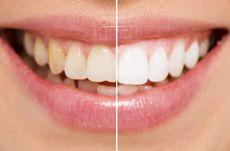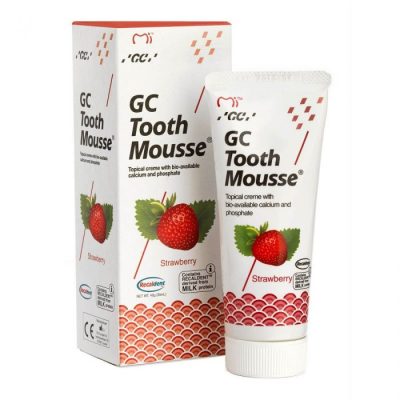Other than the spine-tingling, visceral reaction of fingernails down a blackboard, few sensations are as raw and downright awful as the nerve pain we experience when living with sensitive teeth.

Aaaahh!
We’ve all experienced that feeling. Maybe you’ve eagerly bitten into freezing ice cream or mistakenly gulped back glacially cold air.
Although it doesn’t last forever, the pain from sensitive teeth is sudden, sharp and incredibly unpleasant. It can happen when your teeth are exposed to a variety of hot or cold foods or environments, or even sweet or acidic food. But why?
Sensitive teeth causes
According to Dr Margaret Culotta-Norton, a dentist in Washington DC and former president of the DC Dental Society, there are no ‘at risk’ groups for tooth sensitivity. It can happen to anyone.
Healthy teeth have enamel that protects the layer of dentin beneath, and your tooth roots are protected by gums. But if you’ve worn down your enamel – or if your gumline has receded, then the dentin becomes exposed, and this is where the trouble can start. Cavities, gum disease, cracked teeth, enamel or root erosion are all causes – and all of them expose the dentin. Dentin is connected to the nerve – and nerves trigger pain.
Factors that cause sensitivity
- Brushing too hard – Too much of a good thing is not always a good thing. Vigourous brushing, or brushing with a hard/medium bristle toothbrush can wear down your enamel, not only causing the dentin to be exposed but also encouraging gum recession. So go gently – and only use a soft bristle or electric toothbrush.
- Dental procedures – Sometimes after a dental procedure, your tooth or teeth will be sensitive for a while. Typical procedures include root canal, crown placement, professional cleaning and restoration work. However, the sensitivity is usually short-lived.
- Gingivitis – This is inflamed or sore gum tissue and can result in exposing your tooth root.
- Gum recession – Again, this can happen through either gingivitis or periodontal disease.
- Teeth grinding – This is a classic way of wearing down your enamel
- Plaque build-up – There’s only so much you can do by brushing at home. Regular professional cleans will help remove plaque and avoid damage to your teeth and gums
- Overuse of acidic mouthwash – Some over-the-counter mouth washes contain acids that can exacerbate any tooth sensitivity and further damage the dentin layer. If you like mouthwash, speak to your dentist about a neutral fluoride mouthwash.
- Acidic foods – Acid encourages enamel reduction
Exposed tooth roots
Sometimes the cause of sensitive teeth is not through the breakdown of the enamel, but through the gum – through (as mentioned above) too much brushing around the gum, tooth displacement or bruxism. Your gum is a thick protective tissue that surrounds the teeth like a tight cuff. If the gum wears away, then the tooth root becomes exposed.
 Sensitive teeth after whitening treatments
Sensitive teeth after whitening treatments
Some teeth-whitening treatments, either performed at home or in a dentist chair, contain harsh chemicals to remove the stains that can also remove a little bit of the enamel, leading to tooth sensitivity. These days, formulas have improved, so this is far less of a problem. However, if you suffer from extreme tooth sensitivity, tell your dentist before you proceed with any teeth-whitening treatments.
Sensitive teeth treatment
There are several things you can do to improve life with sensitive teeth; however, it is unlikely that there is a simple ‘sensitive teeth cure’. Sensitive teeth may never completely disappear, according to Culotta-Norton. She says, “unless the reasons why a person’s teeth have become sensitive are completely eliminated, the sensitivity will come and go.”
The most important thing to do is to have your teeth assessed carefully to find out where the pain is coming from and how to treat it. Without a thorough assessment, your condition is likely to get worse.
At-home treatments/behaviour to minimise sensitivity
- Tooth mousse – available at pharmacies, this can be applied for a minimum of three minutes, or a thin layer can be left on overnight
- Avoid acidic foods, cold and hot foods
- Use a fluoridated mouthwash daily
- Only use a soft bristle toothbrush and brush gently
- Don’t grind your teeth – if tooth grinding is a problem, consider getting a mouth guard

Advanced treatments for tooth sensitivity
Sometimes, issues regarding tooth sensitivity will require more serious action, such as:
- Dental crowns, ceramic bonding or inlays: These will help cover any vulnerable spots in the tooth that may be causing sensitivity.
- Surgical gum graft: If the gun has greatly receded, exposing the root, a gum graft will protect the tooth root and reduce sensitivity
- Root canal treatment: This is considered a last resort treatment when all effort ts to minimise sensitivity have failed.
See a dentist
 If your tooth sensitivity is bothering you, book an appointment with one of our dentists at Oxford Street Dental in Leederville and have your teeth professionally assessed. There are all sorts of things we can do. You may need a little help with your gums, your teeth could benefit from a fluoride gel, or maybe you need a crown or filling to help protect your teeth from further sensitivity and discomfort.
If your tooth sensitivity is bothering you, book an appointment with one of our dentists at Oxford Street Dental in Leederville and have your teeth professionally assessed. There are all sorts of things we can do. You may need a little help with your gums, your teeth could benefit from a fluoride gel, or maybe you need a crown or filling to help protect your teeth from further sensitivity and discomfort.
Reference: https://www.livescience.com/44377-sensitive-teeth.html
